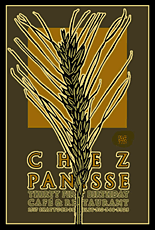Edition of 1299 of which 125 copies are signed 1-125, 26 copies are signed A-Z as artist's proofs. No progressives.
August 9, 2002
5 colors 16-1/4˝ x 24˝
Client: Chez Panisse Café & Restaurant,
1517 Shattuck Avenue,
Berkeley CA 94709. Telephone (510) 548-5525
1-125: Saint Hieronymus Press
Artist's Proofs: Saint Hieronymus Press
My mother made bread twice a week. Bread served as the staple for eight children and two adults. It was good, nourishing bread, thick sliced and crusty, wonderful hot out of the oven, with a glass of cold milk and fat pats of butter. Toast in the morning, sandwiches for lunch, my after school snack, and of course bread with supper. I more or less lived on my mother's bread. Mostly it was whole wheat, with sourdough French a Sunday favorite, egg bread, sweet rolls, rye and pumpernickel punctuating the daily fare. Special holiday loaves enhanced the joys of Easter and Christmas. In addition to bread, we ate plenty of stews and soups, great quantities of hamburger, beans, peanut butter, vegetables and salads fresh from our truck garden. My mother made a lot of yoghurt, which was the main ingredient in a breakfast drink called "tiger's milk." She harvested and dried herbs and fruits when they were abundant, putting them away for winter.
My mother discovered the Food Mill in Oakland, an early health food store, and experimented continually with our diet. Some experiments were not successful: millet was a resounding failure, firmly rejected with loud cries of dismay, and overly health-foody pies and cakes were not well received. The underlying philosophy seemed to be that white things (flour, eggs, rice, sugar) were bad, and that brown things (flour, eggs, rice, molasses, honey) were good. She didn't go too far with this, but the idea was definitely there. We rarely ate any of the increasingly popular convenience food, not so much because it was unhealthy, but because it was just too expensive.
My Depression-era parents' philosophy could be summarized easily: "Better that belly should bust than good vittles go wasted." You Cleaned Your Plate. You ate what you were served, and if it was something that you particularly disliked (and each one of us had something that we particularly disliked) brisk surreptitious swapping soon resolved the problem. If all else failed, we slipped the unwanted tidbit to the dog. He sat under the table at meals and knew how to keep quiet. My favorite foods were bacon, lettuce and tomato sandwiches for lunch, and beans and cornbread for supper. I disliked stewed tomatoes. My sister Lisa disliked beans, and loved stewed tomatoes. My father loved sharp Wisconsin cheddar, lemon merengue pie, and seafood. My mother abhorred seafood and the closest we ever got to it was canned tuna. It went on from there.
Supper was the big communal meal of the day. We ate together, in the kitchen, at a table that was six feet across. Big kids and infants, friends staying after school, my parents occupied with enforcing some bare modicum of table manners and mopping up the Niagra of spilled milk. On Sunday a formal family dinner was served in the dining room, leaving Sunday supper to my father, who usually made something like popcorn or toasted garlic bread.
My mother still bakes bread, though not nearly as much as when the house was full of growing children. She has a truck garden, and harvests far more food than either she or my father can eat, and so preserves it by freezing or drying. A continual ebb and flow of children, grandchildren and great-grandchildren keeps her plenty busy.
As adults, we tend to prefer the foods of our childhood days. I've developed exotic tastes, and don't shy away from the new and strange, but left to my own devices I tend to cook the food I was raised with. I miss my mother's bread.
